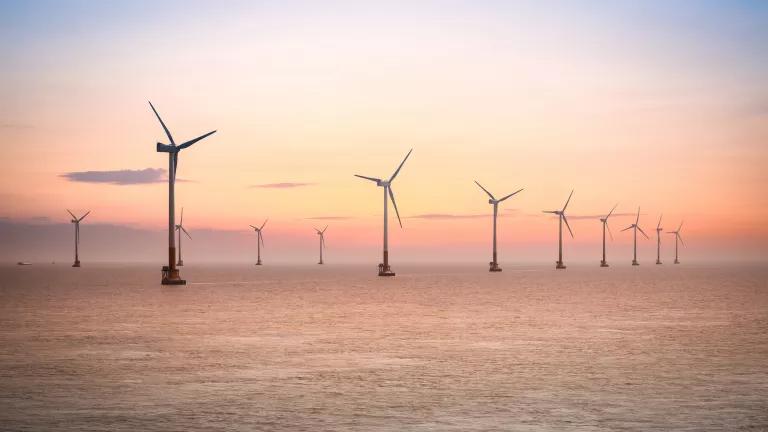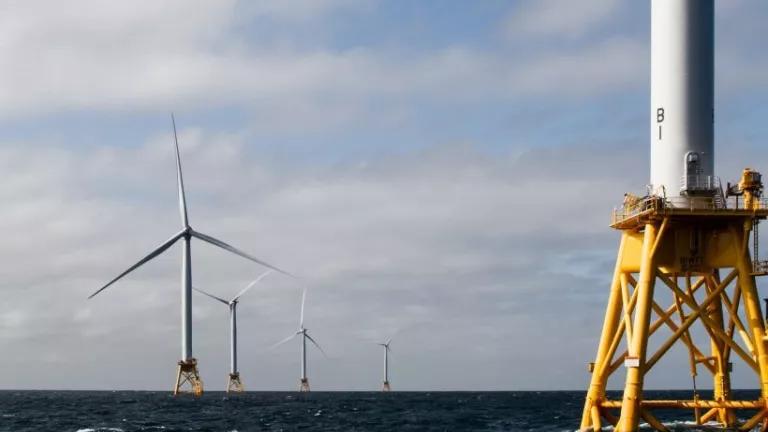SCC Wrong to Penalize Clean Wind Energy, Must Reverse Itself
Offshore wind will protect Virginia's coast from climate chaos and shield Virginians from soaring electric rates & skyrocketing fossil fuel costs.

The SCC Must Not Arbitrarily Penalize Clean Energy: Offshore Wind Will Protect Virginia's Coast from Climate Chaos, and Shield Virginians from Soaring Electric Rates & Skyrocketing Fossil Fuel Costs
Despite Virginians laboring under newly-inflated electric bills due to skyrocketing fossil fuel prices, on top of electric rates that, per the latest state utility data from the feds, were already the 3rd-highest across the entire South, the State Corporation Commission (SCC) took its eye off the ball with its wrong, inconsistent decision on offshore wind.
The SCC’s just-released order – otherwise correctly greenlighting a transformative offshore wind project from the state’s largest utility – includes a presumptive penalty on the utility, if the project does not perform to a pre-determined “capacity factor.” The SCC must reverse that arbitrary penalty, as soon as possible.
The SCC is making a good faith effort to protect Virginians’ pocketbooks. And that comes at an important time, given the steady and increasing rate spikes the SCC has presided over for more than a decade.
But the SCC’s offshore wind decision is the wrong way for the SCC to do its work, flying as it does against regular ratemaking practice across the nation, including the SCC’s own. Looking at all the Commission’s cascade of approvals of expensive and polluting fossil fuel-powered projects over the past decade and a half, and the Commission has approved many, it never included a similar performance penalty. (Though, in retrospect, the SCC may have been wise in all those approvals to include some hold-harmless provision for customers, protecting them from inflationary fossil gas costs, given that those fossil plants today drive the most recent, double digit, $17-25 monthly price spike most Virginians pay, as of this month.)
Given that the SCC has not previously applied performance penalties, wind energy must not be suddenly, for no demonstrable reason, treated differently.
Just as important, the SCC’s wind energy penalty flies in the face of state law. The legislature made a very clear decision, in the 2020 Virginia Clean Economy Act, to shift to clean, non-climate disrupting generation resources; offshore wind is the VCEA’s central climate-protective component, and the VCEA is now the law of the land, including the SCC’s. Indeed, a cleaner, more efficient electric grid is critical to tackle the costly, destructive climate change that looms over our coastal real estate and floods inland communities with extreme weather.
VCEA resources – foremost among them offshore wind – will, along with electric vehicles, be essential to secure Virginia’s ambitious but achievable net-zero-carbon-by-2045 target. Those wind electrons will be even more important, as we increasingly power our cars and buildings with cheaper, cleaner electricity, instead of expensive, polluting fossil fuels.
Yet, the Commission’s decision clearly goes against the VCEA statute (and its own past practice), by slapping our offshore wind utility with unprecedented penalty liability in its operational phase.
A Troubling and Costly SCC Pattern
It is grossly inconsistent for the SCC to apply a performance penalty on wind energy, where it never applied any on the many polluting, still-costly fossil fuel projects it's greenlit over the years.
Perversely, however, the SCC is in fact showing a costly consistency, in its most recent undercutting of cleaner energy resources. Unfortunately, that consistent trend is now hitting Virginia ratepayers, right in the wallet.
The facts: Virginians now pay the highest, most uncompetitive rates, among all four of our also-regulated neighbor states (KY, NC, WV and TN). We now pay the highest rates, all overseen by the SCC, of all but two southern states, from here, all the way over to Texas (that fact according to the most recently-available federal data on utility-specific rates).
This high cost-of-living for Virginia ratepayers is largely due to two factors:
First, the SCC’s greenlighting of a decade-and-a-half long spree of new fossil fuel plants. That just delivered as much as a $25 per month wallop, to the average 1,100 kWh-using ratepayer, owing to an SCC-overseen dependence on expensive methane gas and coal. The SCC has also declined to require solar projects alongside these fossil projects, which would have hedged against these costly projects, given that they have zero fuel costs.
Second, the SCC’s ongoing stifling of clean energy resources. Offshore wind is only the latest clean resource to be handicapped – for years, the SCC has also stifled other clean resources, energy efficiency.
Energy efficiency – that is, commonsense deferred upgrades like insulating Virginia homes and businesses to be cooler in summer and warmer in winter, and converting to LED lighting – is the only energy investment that, by design, lowers rather than increases electric bills. Yet, despite that ability to lower bills, efficiency is the single energy investment the SCC sharply limits, year after year. As a result, today a mere 3% of customers of Virginia’s largest utility receive the bill-lowering benefits of utility energy efficiency programs. And that, while 100% of them pay the third highest rates in the south, and the up-to-$25 per month price spike that just hit our bills.
The SCC’s past actions, undercutting cleaner and cheaper resources are unfortunately amplified through its words. It regularly harrumphs, unprompted, against commonsense and widely supported climate action programs, like RGGI and the VCEA, ominously intoning about threats to "affordability" (never mind that SCC-overseen electric rates are, you guessed it, some of the least affordable of all southern states). The Commission also misleadingly and wrongly casts doubt on the already-proven ability of electric vehicles to inject much needed grid revenue to lower everyone’s total electric bills.
It's unclear where the SCC’s naysaying pronouncements, undercutting clean energy, efficiency, and commonsense climate action come from. Perhaps it's from career culture warriors, or from not reading the trade journals that regularly detail the bill-lowering opportunities of a clean, 21st century integrated energy grid.
Wherever the SCC’s antipathy to lower cost clean and efficient resources comes from, it’s getting expensive for everyday Virginians, as seen in Virginia’s uncompetitive regional electric rates when compared to every one of our also-regulated neighbors. The bottom line is that the body charged with ensuring low rates has overseen rates that are now the third-highest across the American South, and that needs to stop.
Here’s how the SCC can right the ship and be a thriving, active participant of the evolving 21st century energy grid.
How the SCC Can Get Its Offshore Wind Decision – and Ratepayers’ Soaring Rates – Back On Track
Against its own backdrop of antagonistic rhetoric and costly decisions, it is troubling to see the SCC go out of its way to pre-emptively penalize Virginia’s single-largest clean energy advance.
To get back on track, the SCC should, first and foremost, withdraw its preemptive performance penalty on offshore wind.
If the SCC is genuinely concerned about protecting customers from excess costs, as it should be, there are many ways to do this while not running afoul of clearly-stated statutory goals, nor treating wind investment differently than the SCC has treated past fossil fuel investments.
First, the SCC should impose a cost cap on offshore wind, above which the utility must make a showing why the cap was exceeded, and prove that it was not negligent, unreasonable, or imprudent in doing so.
Second, if the SCC is interested in optimizing the project’s performance, it could indeed set a realistic performance metric (measured as a “capacity factor”), below which the company must detail precisely why any shortfall occurred. If there was negligence on the company’s part, then penalties should apply. In any event, the company should not be arbitrarily penalized for the array of oceanic factors beyond the company’s control.
Third, for a project of this scope and importance, the SCC should appoint a third-party to oversee the entire project with authority to conduct forensic accounting. And it should do so now.
Lastly, for the second round of offshore wind buildout as contemplated by the VCEA, the SCC should immediately begin assessing other offshore wind build/ownership models, particularly the more standard EPC (engineering, procurement, and construction) model, wherein Virginia customers do not “own” the project but rather receive the energy under a third-party power purchase agreement.
These commonsense oversight mechanisms will ensure that this zero-fuel cost renewable resource benefits everyone. Meanwhile, the SCC must put energy efficiency at the front of the resource line, rather than continuing to expensively make it languish at the very back. That will lower our skyrocketing rates by expanding Virginia’s paltry efficiency offerings beyond just 3% of its customer base. And while they’re at it, the SCC must expand - not stifle - electrification and EV-charging programs, to lower our excessive electric rates, through added grid revenue.
By taking these sensible steps, the SCC would not only advance state policy to pursue clean energy and secure Virginia’s net-zero carbon emissions target by 2045. That renewed focus on the fundamentals of today’s modern grid would also honor the SCC's own policy of lower costs-of-living for all Virginians.




